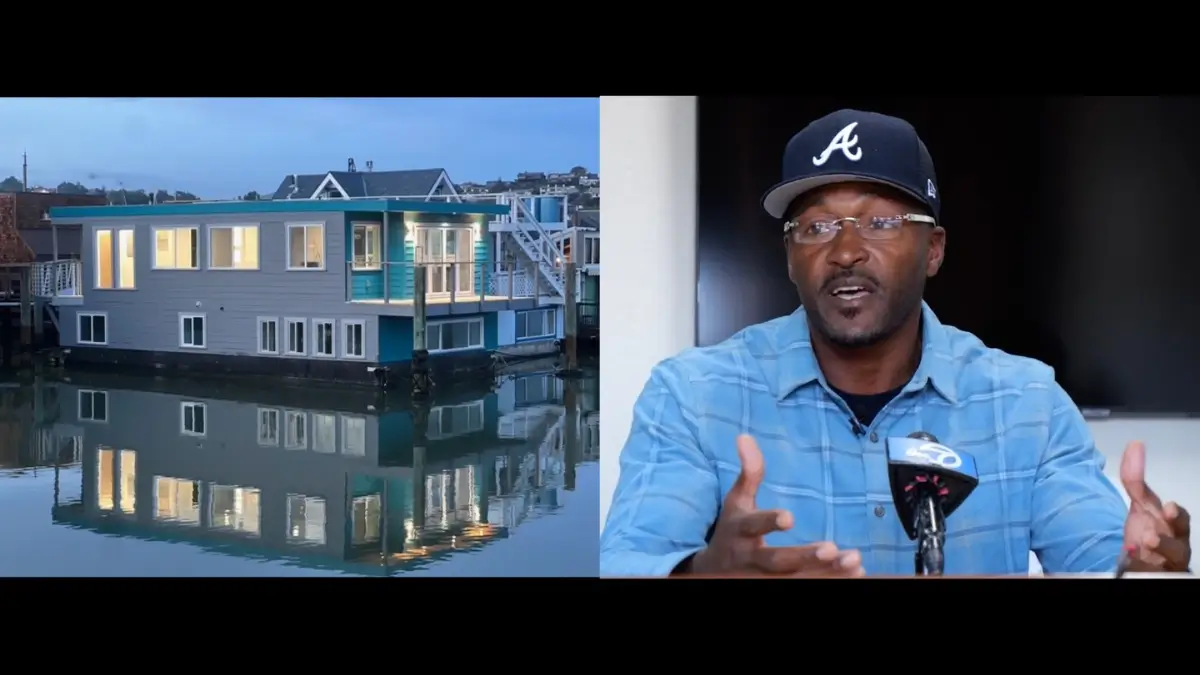A Black entrepreneur who faced burdensome red tape and resistance from officials in Marin County, California, when he tried to renovate and sell floating homes in two tony waterfront communities filed a federal lawsuit claiming racial discrimination.
Deitrick Burks bought three floating homes from Docktown Marina in Redwood City in 2019 with a plan to fix them up and move them to the more upscale Kappas Marina and Waldo Point Harbor floating home communities in Sausalito, 36 miles north, and then to sell them at a tidy profit.
The first floating home, which he renovated and sold in partnership with Gary Star, a white investor who had experience in Sausalito real estate and acted as the face of the project, sailed through the permitting process with no issues and was sold at fair market value, according to his lawsuit filed in U.S. District Court in California on Aug. 19 (and obtained by Atlanta Black Star).

Burks and Star were only required to obtain an occupancy permit to relocate the floating home to Sausalito prior to the sale.
But as Burks embarked on the permitting process for his next two floating homes, the lawsuit says local community members discovered that the owner was African-American, and put up “racially-motivated resistance.”
That included 90 residents petitioning the Chief Building Official for Marin County, William Kelley, to change ordinances and permit requirements to specifically target Burks’ projects and to prevent him from selling his homes in those communities, he claims.
The 2023 petition stated that Burks intended to make way for his floating home by removing and destroying a houseboat that was created using a 1911 historic tugboat, reported Marin Independent Journal. The petition said that Burks’ replacement would be “a far larger floating home that is out of character with our dock.”
The Journal noted that the dispute with Burks was not the first time that the floating home community in Marin had expressed concerns about a houseboat being brought in from outside the county. In 2020, real estate agent Paul Bergeron, who is white, caused a stir when he relocated a floating home from Docktown to Kappa’s Marina.
“Change makes people feel uncomfortable,” said Bergeron, who now lives on a houseboat on Richardson Bay in Sausalito.
The complaint says Kelley collaborated with the Marin County Board of Supervisors to amend sections of the Marin County code to stymie Burks’ business progress while greenlighting the floating home projects of several similarly situated developers who were not African-American and who did not face the same regulatory hurdles.
The proposed new requirements by the board included: treating all floating homes relocated to Sausalito marinas as new construction, which meant a slew of additional building code requirements; requiring extensive documentation regarding the history, origin and mooring location of the home during the previous 12 months, and descriptions of all modifications completed on it; requiring a licensed marine surveyor or civil engineer to verify the dimensions of the floating home; and requiring the Director of Public Works to inspect and approve it prior to the home being towed into Sausalito.
The lawsuit says county officials forced Burks to comply with these new requirements to the building code before they were lawfully adopted by the board on March 19, 2024. His floating homes met existing height and length requirements, but his certificate of occupancy application was stalled for more than a year for not meeting the proposed new code requirements, he says, which “were not law and were not enforceable.”
Meanwhile, Burks faced opposition in local media. Board of Supervisor Stephanie Moulton-Peters told the Marin Independent Journal that “now that we have people bringing in boats from other communities, it’s important to have the standards clarified and made very transparent.”


In one article, Kelley and Moulton-Peters suggested Burks was “a crook,” the lawsuit says, and another included a cartoon depicting monstrous-looking aliens arriving in a small boat to Waldo Point Harbor, greeted by a resident who remarked, “Another ‘Out-Of-Towner.’”
Due to the setbacks and delays selectively imposed on Burks, the lawsuit says, he had to invest more than a million dollars in remodeling and carrying costs, and incurred significant loan interest payments while awaiting permit approvals. He says he was forced to sell one of his floating homes at a below-market price, earning a smaller profit than he would have made without the restrictions.
Burks says he also lost out on an opportunity to collaborate with a movie director with a history of working with Netflix, who started filming a documentary about his floating homes venture, but eventually abandoned the film project due to the delays.
The lawsuit alleges that Marin County and Kelley racially discriminated against him by violating his equal protection rights under the Fourteenth Amendment to acquire, enjoy, own and dispose of property by capriciously requiring significant and arbitrary inspections and permitting for African American floating home owners that they did not enforce against non-African American floating home owners.
He seeks a jury trial to determine general, special and punitive damages to compensate him for unwarranted expenses, loss of profits, emotional distress, anxiety, and “a loss of sense of security, dignity, and pride as United States Citizens.”
“I just wanted an equal opportunity to go out and be successful” Burks said at a press conference with his lawyers on Tuesday. “It was stressful. I just couldn’t believe it — not in the world that we live in today … that a community would come together to create such friction.”
“What you have is the county government bending to the will of racist NIMBYism,” said Andanté Pointer, Burks’ lawyer. “And in this case it was ‘Not In My Floating Yard.’”
Marin County Director of Communications Laine Hendricks said in a statement that the county had not yet been served with the lawsuit but will carefully review it and respond through the legal process once it is received. She added that the county’s building policies “are applied uniformly and are not motivated by race.”
The defendants have 21 days to respond to the complaint after they are served.
Great Job Jill Jordan Sieder & the Team @ Atlanta Black Star Source link for sharing this story.



